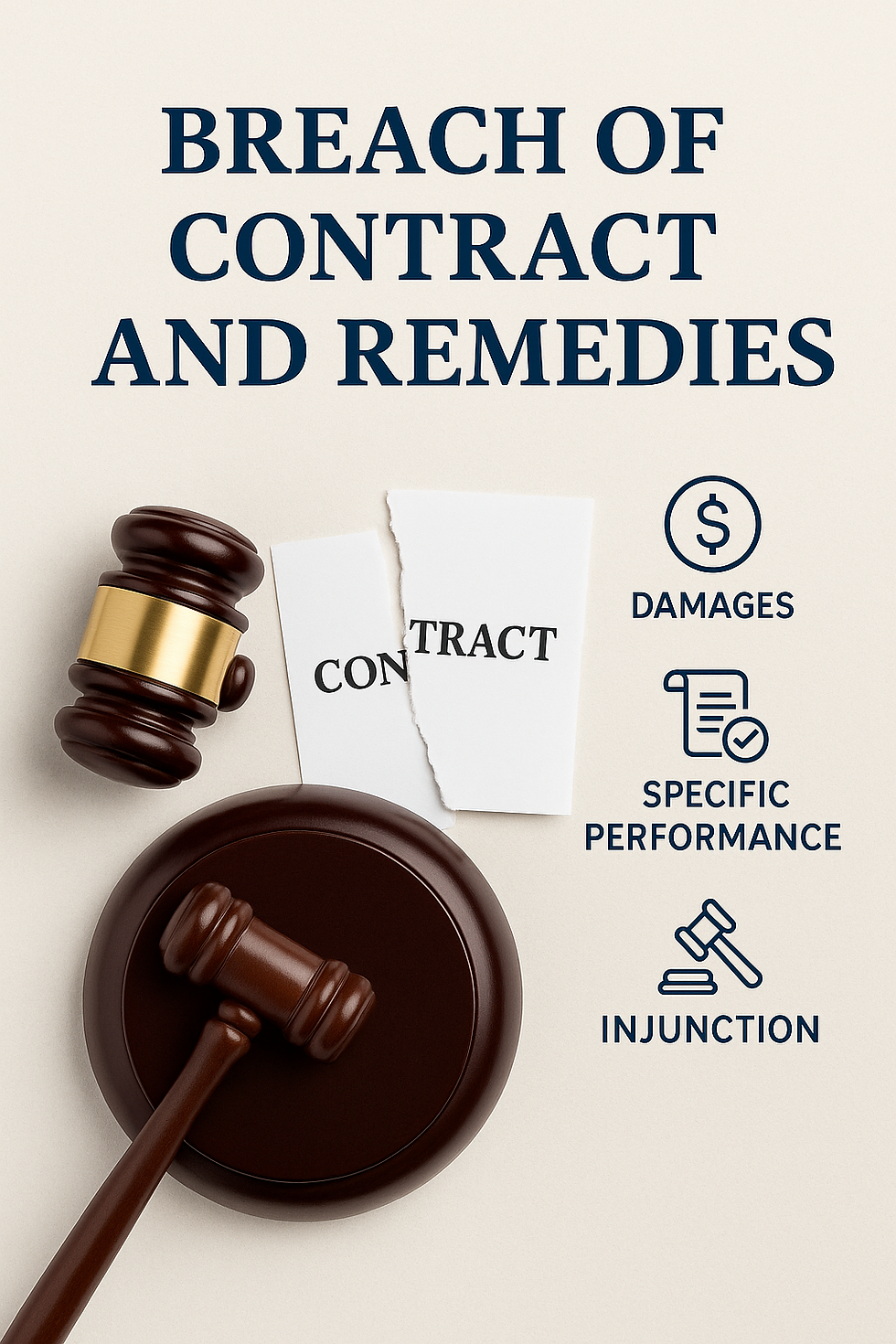Breach of Contract and Remedies
- Legal Amenity

- Jul 22, 2025
- 4 min read
Contracts are the foundation of modern commercial and personal relationships. Whether it's a service agreement between businesses, an employment contract, or a real estate transaction, parties rely on the enforceability of contracts to ensure that promises are kept. However, not all contractual obligations are met, leading to what is known as a breach of contract. This blog explores the types of breaches, their legal implications, and the remedies available under law.

What Is a Breach of Contract?
A breach of contract occurs when one party fails to fulfill their obligations as stipulated in a legally binding agreement. The breach may be partial, material, or anticipatory, each having different legal consequences.
Minor (Partial) Breach: A less serious breach that does not affect the core purpose of the contract. The non-breaching party may still have to fulfill their obligations but can seek compensation for the deviation.
Material Breach: A significant failure that strikes at the heart of the contract, making it impossible to achieve its intended purpose. This allows the non-breaching party to terminate the contract and claim damages.
Anticipatory Breach: Occurs when one party indicates in advance that they will not fulfill their contractual obligations. The other party can treat this as an immediate breach and seek remedies.
Common Causes of Breach
Several factors can lead to a breach of contract, including:
Non-performance: One party fails to do what was promised.
Delayed performance: Obligations are performed late, causing loss to the other party.
Improper performance: The agreed-upon terms are not followed correctly.
Failure to pay: One party withholds payment without lawful justification.
Understanding the nature and cause of the breach is crucial in determining the appropriate remedy.
Legal Remedies for Breach of Contract
The law offers a variety of remedies to the aggrieved party, depending on the extent of the breach and the terms of the agreement. The main objective of legal remedies is to restore the injured party to the position they would have been in had the contract been properly performed.
1. Damages
Damages are the most common remedy for breach of contract. They are monetary awards granted to compensate for losses suffered.
Compensatory Damages: Aim to put the injured party in the position they would have been in had the contract been fulfilled.
Consequential Damages: Also called “special damages,” these cover indirect losses caused by the breach, such as lost profits.
Nominal Damages: A small amount awarded when a breach occurred but no significant financial loss resulted.
Liquidated Damages: Pre-agreed sums mentioned in the contract itself, payable in case of a breach.
Punitive Damages: Rare in contract law and usually awarded when the breaching party’s conduct is found to be egregiously wrongful or fraudulent.
2. Specific Performance
This is an equitable remedy where the court orders the breaching party to fulfill their contractual duties. It is usually granted when monetary compensation is inadequate—typically in contracts involving unique items such as real estate or rare goods.
For example, if someone agrees to sell a piece of land and later refuses, the buyer may seek specific performance rather than damages, as land is considered unique.
3. Injunction
An injunction is a court order that restrains a party from doing something that would breach the contract. It is commonly used in non-compete or confidentiality agreements.
Prohibitory injunctions prevent a party from acting in a way that breaches the contract.
Mandatory injunctions compel a party to undo a breach or perform a contractual obligation.
4. Rescission
Rescission refers to the cancellation of the contract and aims to return both parties to their original pre-contractual position. It is often sought in cases of misrepresentation, fraud, or undue influence.
Once rescission is granted, the contract is considered null and void, and neither party has any further obligations under it.
5. Restitution
Restitution involves returning any benefit one party has unjustly gained at the expense of the other. This remedy seeks to prevent unjust enrichment and is often coupled with rescission.
Preventive Measures
While remedies provide legal relief, the better approach is to prevent breaches altogether. Some preventive strategies include:
Clear drafting: Ensure the contract terms are specific, unambiguous, and legally enforceable.
Defined timelines: Include clear deadlines and milestones.
Force Majeure clause: Account for unforeseen circumstances that might prevent performance.
Dispute resolution clauses: Provide mechanisms like arbitration or mediation to resolve conflicts without litigation.
Breach of Contract in Indian Legal Context
Under Indian law, the Indian Contract Act, 1872, governs breach of contract and associated remedies. Sections 73 and 74 are particularly relevant:
Section 73: Entitles the aggrieved party to compensation for any loss or damage caused by the breach.
Section 74: Deals with liquidated damages and penalties stipulated in contracts.
Indian courts emphasize compensating for actual loss rather than penalizing the breaching party unless gross misconduct or fraud is involved.
Conclusion
Contracts are central to the smooth functioning of business and legal affairs. While breaches can occur for various reasons, legal remedies exist to protect the rights of aggrieved parties and to ensure justice. Whether it’s damages, specific performance, or rescission, the appropriate remedy depends on the nature of the contract and the circumstances of the breach. Seeking professional legal advice is essential to assess the best course of action and to safeguard one’s interests.
__________________________________________________________________________________
FAQs
Q1. What are the main remedies for breach of contract in India?
Remedies include damages, specific performance, injunction, and contract rescission under the Indian Contract Act.
Q2. Can a party claim compensation for mental distress due to breach?
Generally, compensation is awarded for financial losses, but in rare cases, emotional distress may be considered if linked to the contract.
Q3. What is the time limit to file a suit for breach of contract?
Under the Limitation Act, a breach of contract suit must be filed within 3 years from the date of breach.



Comments